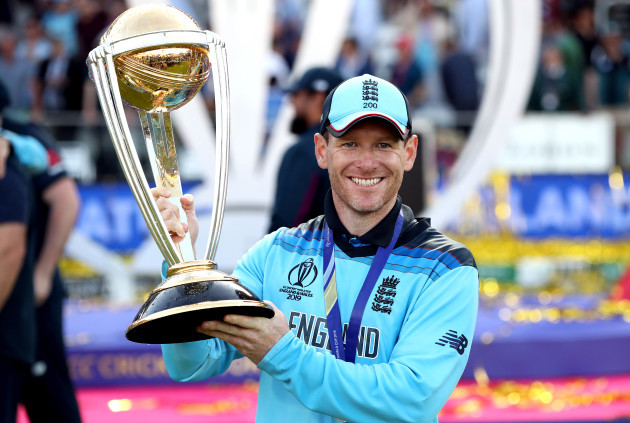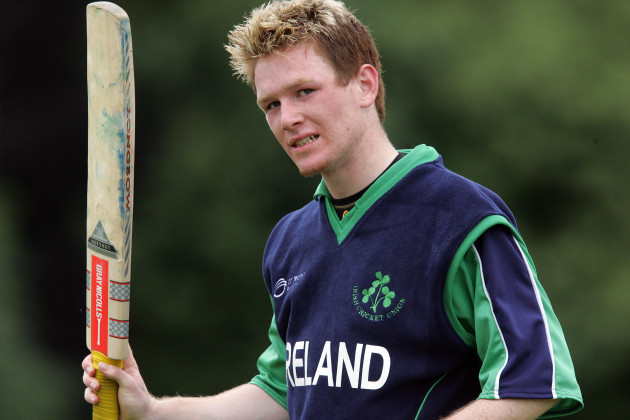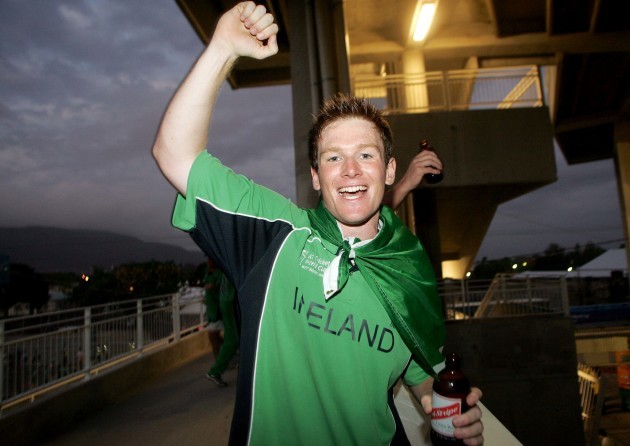RUSH CRICKET CLUB is a small, postage-stamp ground on the Skerries Road. The straight boundaries are short, the adjourning housing estates protected only by a tall mesh netting.
The design is such that the clubhouse wraps around the boundary on this near side and the slope, running down from the square towards the changing rooms, often makes Kenure Park a batsman’s paradise.
Rush is a small, community-driven club in comparison to its north Dublin neighbours, The Hills and North County, but a club that has consistently punched above its weight in terms of success, the foundations for which laid by a revered youth section.
Like many cricket clubs on this island, it is one steeped in family tradition, the love of the game handed down through the generations, and that was no different for the Morgans, the cricket-loving family from down the road.
Yesterday afternoon, dozens of club members — young and old — gathered in the Rush pavilion to watch events from Lord’s unfold, bursting with pride that one of their own was playing on the grandest stage of all.
What followed was scarcely believable, yet when Eoin Morgan — England’s Dublin-born captain — made history by lifting the Cricket World Cup aloft, nobody in that small seaside town in Fingal was surprised. For this was the culmination of a childhood dream, a lifelong ambition, and a remarkable journey.
From the moment a young left-handed batsman was brought down to Rush Cricket Club by his father, Jody, in the early 1990s, to Sunday’s dramatic denouement to the most thrilling World Cup final, every step along the way contributed to the making of Eoin Morgan, as a cricketer, captain, leader, person and World Cup winner.
Such was his prodigious talent, Morgan would always play up the age-grades, often two, three years above, and after leading Rush to the U11 All-Ireland title, he captained Ireland U13s and earned a sports scholarship to Catholic University School on Leeson Street.
Morgan’s cricketing ability may have been nurtured and developed in Rush, Malahide and North County but it was in secondary school, where he won three Leinster Junior and three Senior Cup winners’ medals, that the true traits of his character — combativeness, perseverance, calmness, confidence and respect — were cultivated.
He made his senior international debut for Ireland at the age of just 16 — cap number 642 — and was instrumental in Ireland qualifying for their first World Cup in 2007, but the landscape at the time, and Irish cricket’s standing within the world game, meant a highly ambitious and driven Morgan made no secret of his desire to reach the top.
And, unfortunately, that meant chasing his dream with England. Time spent at Dulwich College in London and with Middlesex only strengthened his desire to do so.
“From the age of 13, I wanted to play cricket for England,” he said previously. “I’ve never felt any shame in saying this is what I wanted to do. And the people at home involved in cricket, they were like, ‘Fair play, it’s going to be unbelievable if you make it.’”
The last of Morgan’s 63 caps in Ireland green came against the Netherlands in 2009, when he smashed a spectacular 76 from 62 balls to secure qualification for the 2011 World Cup in India. Although the star of Ireland’s batting line-up, Morgan was dropped by coach Phil Simmons for the final two games of that qualifying tournament as his attention started turning to bigger and better things.
That summer, a decade ago, he was called up by England.
Morgan’s decision to declare for England was always going to irk, even anger, some. He captained them for the first time at Malahide, his old ground, against Ireland in the memorable One-Day International in 2013.
Scoring a match-winning century, the Dubliner received a mixed reception that day.
At that stage, however, he had become one of the most sought-after batsmen in the one-day game, earning multi-million Euro contracts in franchise leagues around the world, while emerging as a real leader within the England dressing room.
He took over the captaincy duties on a permanent basis in slightly chaotic circumstances ahead of the 2015 World Cup, a tournament that proved to be a humiliating disaster for England as they crashed out after the first phase of games. Morgan scored just 90 runs in five innings, as his career — and English cricket — hit a low ebb.
But, as is so often the case in sport, hitting rock bottom can also be the turning of the tide. Under Morgan, the ECB’s then director of cricket, Andrew Strauss, and Australian coach Trevor Bayliss, England embarked on a root-and-branch reform of their one-day international set-up.
Adopting an aggressive game-plan under Morgan’s innovative and superb captaincy, England’s journey up the world rankings and to the top of the tree was four long years in the making, a white-knuckle ride of highs and lows.
“This means absolutely everything,” he said yesterday. “It’s been an absolutely incredible journey. I still can’t quite believe it, that’s why I’m carrying it [the trophy] around as much as I can.”
At the World Cup, Morgan — England’s most-capped ODI player — led from the front. In their opening game, against South Africa, he won his 200th appearance and scored his 7,000th run in ODIs.
Against Afghanistan at Old Trafford, the 32-year-old played one of the most memorable innings in one-day history, bludgeoning 148 while hitting the most sixes [17] by any player in a one-day game.
At Lord’s, shortly after 8pm on Sunday evening, Eoin Morgan made history under the famous pavilion at the Home of Cricket, his England team becoming national heroes – à la Freddie Flintoff and KP in 2005 — to end a 44-year wait for the country who invented this very game.
Up in one of the corporate boxes, Jody — there every step of the way from Kenure Park, to CUS, to Ireland, to England — watched on as his son achieved his dream and lifted the Cricket World Cup in front of a capacity crowd of 30,000 and a worldwide TV audience of millions.
The dramatic circumstances of England’s victory and the sheer pandemonium of what unfolded in the middle will always be remembered by those there, those watching on the other side of the screen, and those England players who delivered under the immense weight of expectation.
But, for the club members in Rush, the school teachers in CUS and those who simply remember seeing a young Eoin Morgan on the cricket pitches of Ireland in his formative years, this will have meant just as much.
“Like any club, we try to encourage young people to play sport,” Rush Cricket Club posted on Twitter late last night.
“They might enjoy it. They might meet people who will become lifelong friends. They might even discover they are quite good at the game itself.
“And for a very, very select few, they might discover they have the skill it takes to become a world champion. We never dreamed our club would play a part in that career path for someone. But for every World Cup winner, the path has to start somewhere.
“We are beyond proud of Eoin.”
The42 is on Instagram! Tap the button below on your phone to follow us!



